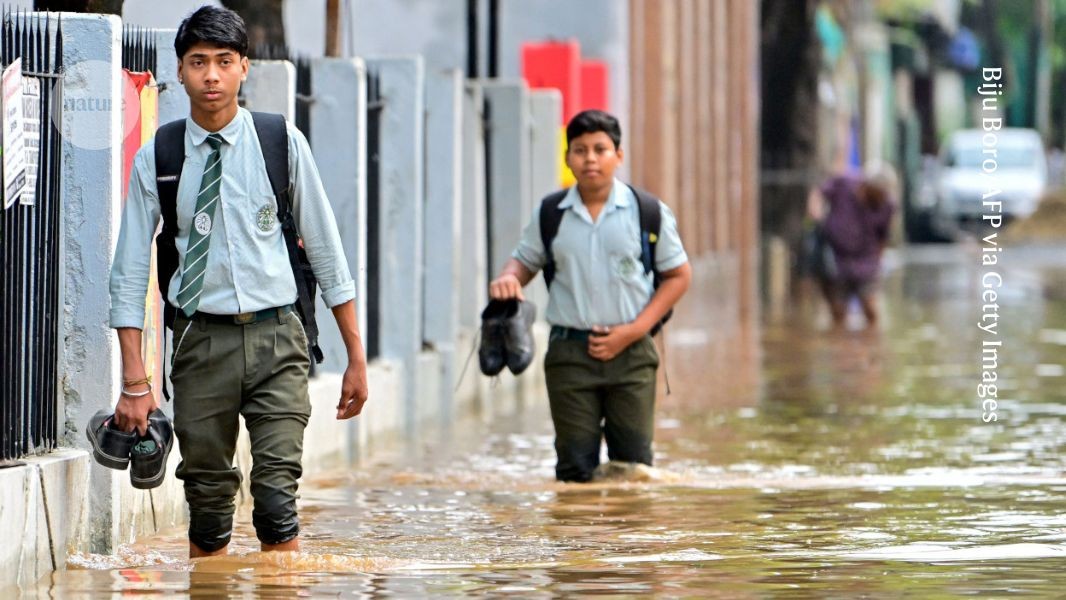Time for adults to finally act like adults on climate change

A report detailing how climate inaction will consign people born today to a lifetime of weather extremes must awaken a sense of responsibility

Children wade down the street during last month’s flash floods in Guwahati, India.Credit: Biju Boro/AFP via Getty
“You have stolen my dreams and my childhood with your empty words.” This rebuke to the delegates at the United Nations Climate Action Summit in New York City in 2019 came from a tearful Greta Thunberg, founder of the children’s climate movement Fridays For Future. Then aged 16, she urged attendees to inject more urgency into keeping global warming to within 1.5 °C of pre-industrial levels. Since then, hundreds of thousands of children around the world have made similarly impassioned appeals to adults to heed the overwhelming evidence of the dangers of climate change. But so far, a grown-up sense of responsibility is lacking.
Quantifying what climate change will mean for those being born now is an active topic of research. This week in Nature, one group of climate researchers reports findings (L. Grant et al. Nature 641, 374–379; 2025) that must surely make adults take more notice of what younger people are saying. Building on an earlier study (W. Thiery et al. Science 374,158–160; 2021), Luke Grant, a climate researcher at the Vrije Universiteit Brussel, and his colleagues report that children and young people born in the present decade face exposure to heatwaves, crop failures, floods, droughts, wildfires and tropical cyclones, in a way that their parents and grandparents never did — and that this applies pretty much anywhere in the world.
As an example, people who were born in 1960 and spend their lives in Brussels are projected to experience three heatwaves in their lifetimes. Those born in 2020 and who live in Brussels will experience an average of 11 heatwaves, assuming warming can be kept to 1.5 °C by 2100. That same cohort is projected to live through 18 heatwaves if warming reaches 2.5 °C, and 26 heatwaves for 3.5 °C of warming. (If all existing climate policies are implemented, global temperatures are expected to be 2.7 °C higher than in pre-industrial times by 2100.)
The researchers have performed this analysis for every country, and the results are devastating. Some 111 million children born in 2020 will have what the authors call “an unprecedented life” of heatwave exposure in a world where temperatures increase to 3.5 °C. The researchers say that represents 92% of that birth cohort. Unprecedented heatwave exposure will still be experienced by around 62 million children born in 2020 even with 1.5 °C of warming.
The majority of those affected live in tropical countries, where the effects of warming will be markedly worse than in other regions and where there is comparatively little infrastructure for climate resilience. The numbers of children living through droughts, crop failures, flooding and wildfires are similarly distressing. “The younger a person is, the higher the likelihood of unprecedented exposure to climate extremes,” the authors say.
Mindful of their responsibilities to future generations, co-author Wim Thiery told Nature that they didn’t stop at reporting these findings. The scientists took their research to the charity Save the Children, which advocates for and supports vulnerable children all over the world. Martina Bogado Duffner, a senior adviser on climate with the charity, says UN member states must now take more urgent and ambitious action to achieve the 1.5 C target, and allocate US$300 billion annually in climate finance, which was agreed at last year’s UN climate conference COP29, held in Baku.
Together with Save the Children researchers, the study’s authors have written a longer report (see go.nature.com/3yzshuu) that draws on the findings of the Nature study, but also incorporates the voices of children, who are unsparing in saying that they are being let down by adults. “People claim that the climate crisis is going to be a major problem in the future,” says Vesa, who is 14 years old and from Albania. “What they don’t realize is that it is happening right before their eyes.”
All those working in climate change today need to realize that many of those born in 2020 will still be alive in 2100, when some of the most distressing impacts are forecast. Vesa has a simple and blunt message: grown-ups need to recognize that there is an emergency and act accordingly. “Currently, you’re the adults in this world. So get a grip and act like actual adults.”
Nature 641, 282 (2025)
doi: https://doi.org/10.1038/d41586-025-01380-w
This story originally appeared on: Nature - Author:furtherReadingSection

















